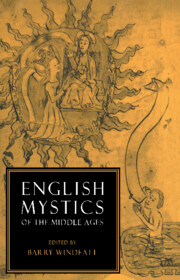Book contents
- Frontmatter
- Contents
- Acknowledgements
- Abbreviations
- Editorial note
- Introductory essay
- RICHARD ROLLE (c. 1300–1349)
- ANONYMOUS
- WALTER HILTON (d. 1396)
- JULIAN OF NORWICH (1342– after 1416)
- MARGERY KEMPE (c. 1373– C. 1440)
- ANONYMOUS ENGLISH TRANSLATORS
- RICHARD METHLEY (1451/2–1527/8)
- 24 To Hew Heremyte: A Pystyl of Solytary Lyfe Nowadayes
- Notes
- Guide to further reading
- Glossary
24 - To Hew Heremyte: A Pystyl of Solytary Lyfe Nowadayes
Published online by Cambridge University Press: 06 July 2010
- Frontmatter
- Contents
- Acknowledgements
- Abbreviations
- Editorial note
- Introductory essay
- RICHARD ROLLE (c. 1300–1349)
- ANONYMOUS
- WALTER HILTON (d. 1396)
- JULIAN OF NORWICH (1342– after 1416)
- MARGERY KEMPE (c. 1373– C. 1440)
- ANONYMOUS ENGLISH TRANSLATORS
- RICHARD METHLEY (1451/2–1527/8)
- 24 To Hew Heremyte: A Pystyl of Solytary Lyfe Nowadayes
- Notes
- Guide to further reading
- Glossary
Summary
Three groups of texts by the Carthusian Richard Methley survive. Trinity College, Cambridge, MS o. 2. 56 (1160) contains a series of autobiographical spiritual treatises in Latin from the first period of Methley's monastic life and recording received graces: Scola Amoris Languidi (written August 1484) Dormitorium Dilecti Dilecti (1485) and Refectorium Salutis, a kind of mystical diary recording a sequence of ecstatic experiences and spiritual presentiments day by day over several months in 1487. The London Public Record Office Collection SP 1/239 contains the second half (chs. 14–27) of Experimentum Veritatis, which apparently dealt as a whole with the discretion of spirits and stirrings, and Methley's English Pystyl to Hew Heremyte. Pembroke College, Cambridge, MS 221 contains Methley's glossed translations into Latin of The Cloud of Unknowing and The Mirrour of Simple Soules, the latter completed on 9 December 1491. The extant texts also allude to some now lost works, including a Defensio Solitarie sive Contemplative Vita.
The Refectorium records that Methley entered Mount Grace Charterhouse aged twenty-five, and here he apparently spent all his Carthusian life, recorded at his death as vicar. He was perhaps born at Methley, near Leeds, but a note in Pembroke MS 221 indicates that his real name was Furth. Although a competent Latinist, Methley's autobiographical writings say nothing about his education, but he was evidently well-read in English spiritual writings of the previous century: in the Refectorium he distinguishes his position from that of Rolle1 he is aware of the problematic aspects of The Mirrour and in translating and commenting on The Cloud, he suggests a developing spiritual maturity.
- Type
- Chapter
- Information
- English Mystics of the Middle Ages , pp. 265 - 271Publisher: Cambridge University PressPrint publication year: 1994
- 1
- Cited by



